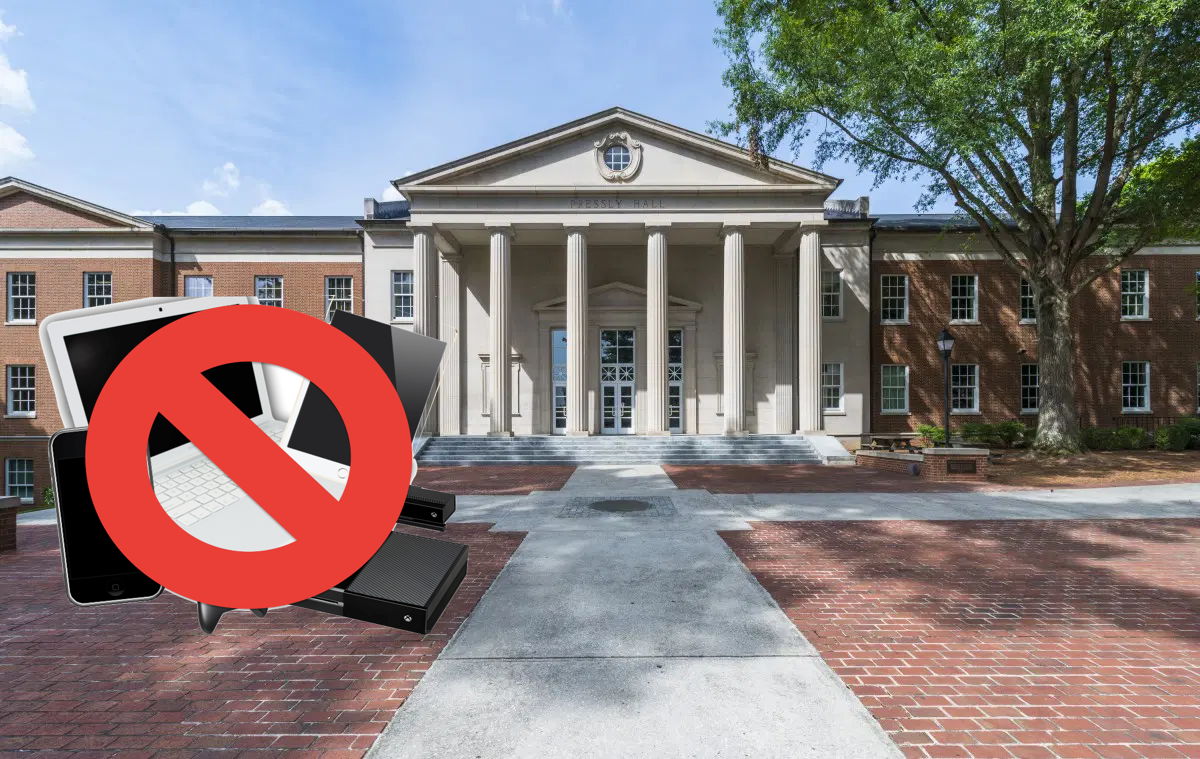Following continuous concerns from teachers and counselors about excessive phone usage, Westminster has finally decided to adopt an “electricity free policy,” banning all items that require electricity or batteries from the Westminster campus.
This policy comes as a wave of schools across the United States roll out phone limitation policies. In 2024 seven states—Florida, Indiana, Pennsylvania, Virginia, Delaware, Minnesota, and Ohio—adopted legislation to curb phone use on school grounds. These policies range from laws that ban phones from school property to legislation that allocates monetary funds to purchase lockable bags to store students’ phones.
Inspired by these programs, Westminster has elected to implement its own policies, but not to be outdone, the innovative ban will remove all technology, as opposed to simply targeting phones. The full policy, which will be shared in the Wildcat Updates next Monday, defines “technology” as any item that “relies on a battery or electricity to function.” Next week students will be expected to return computers and, of course, to leave all watches, phones, AirPods, and calculators at home. Students who require diabetes pumps, pacemakers, and other life-saving technology will be graciously accommodated, if they have reliable doctor’s notes to support their claims.
These regulations are expected to prevent the many negative repercussions associated with phone usage in academic environments. Research shows that phone access in the classroom fragments focus, hinders social development, and limits academic performance. These policies will also prevent the use of phones as a tool for cyberbullying on school grounds. It is expected that this new policy will reduce students’ stress and shape calm, present, and connected learners.
Excited to experience the benefits of a “tech free” environment, the school has begun efforts to prepare the launch of this revolutionary policy; in the coming weeks calculators will be replaced by abacuses, projectors with chalkboards, printers with printing presses, and clocks with an enormous sundial on Spatio. While for many teachers this change is welcome, some students are yet to be persuaded, hesitant about how it will impact their habits.
“Phones are an important part of how I stay connected with my classmates throughout the day. When I am seeking out friends at lunch or have a question about an assignment, I find comfort knowing that they are only a quick text away,” says Senior XX.
She is not the only one with this concern; many students feel that their phones are a vital part of how they keep in touch, especially those with whom they do not overlap schedules or peers from other local schools. While the administration believes that this policy will shape a more socially connected community, students fear it might have the opposite effect.
The student body has also raised concern about how these extreme policies will affect their education, particularly in courses like math, where calculators were considered an integral classroom tool. “A calculation that previously took five seconds now takes five minutes. I find my hand cramping as I copy down a ten-step formula and substitute in all the values of my statistics problem, a process that the calculator can execute instantly,” shared XXX. Computer science students will adapt to writing code on paper, artists will no longer use digital models, and English teachers will learn to function without digital PDFs of classroom texts.
One somewhat expected product of their policy has been the loss of an important function: printing. As printers require electricity to function, they will be fully eliminated from campus. Teachers will turn to the past, either tediously copying assignments by hand, or using the newly installed printing press on the bottom floor of Broyles to duplicate worksheets.
That said, some vital technologies will be, regrettably, exempt from this policy. Opting out of the use of outhouses, the administration has voted to maintain the regular functions of all bathrooms with sensor-operated toilets on campus. And, because torches and candles were deemed a fire hazard, overhead lighting will continue to be used to light up the school. “I am really glad that our current restrooms and lighting appliances will be exempt from the new policy. It’s nice to have a small piece of the 21st century as we acclimate to an environment without electricity,” said Junior XX.
While the administration has acknowledged that this transition will not be easy, for students or teachers alike, they encourage the community to approach the change with an open mind. The Westminster website describes the transition as an “exciting challenge for students and teachers to embark on in partnership with one another. We look forward to seeking how relationships and learning are transformed in our community.”
As the first school to adopt these innovative policies, Westminster has attracted attention worldwide. The Westminster website has received over 2,000 hits in the past three days and the hashtag #NoElectricityWestminster is trending on Instagram, Facebook, and X. Over the next few months educators from all over Atlanta and the globe are scheduled to travel to Westminster to see these policies in practice and evaluate the viability of them in their own schools.
Categories:
Westminster Unveils Revolutionary Technology Policy
More to Discover






